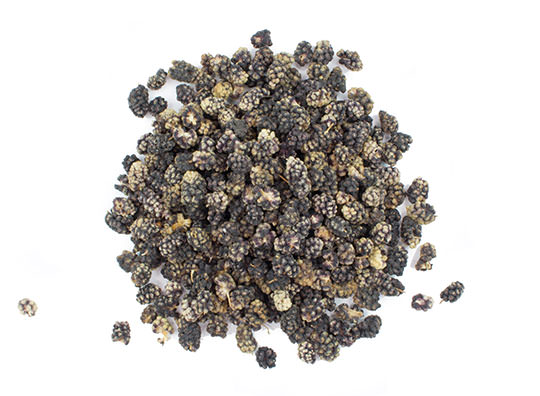Black Mulberry
CrunchyMulberries are the fruit of mulberry trees, and they have a sweet flavor and contain an impressive amount of nutrients. The nutrients found in mulberries have numerous health benefits, and is a great alternative to sugar. These characteristics have gained the interest of a lot of people around the world, and has held to calling it the next super beery.
Mulberry trees are one of the vital assets for individuals in the silk business, since the leafs of the tree are the only food source of silkworms. Mulberry trees are native to East Asia, and they were introduced to North America to help initiate the silk business during the colonial times.
Naturizon provides white and black mulberries in bulk format which can be directly used in baking process, creating exciting new dished, mixes, or consumed directly.

HEALTH BENEFIT
Chinese herbal medicine has utilized mulberries tress for thousands of years for treating diseases, such as diabetes, anemia, arthritis, and heart disease. Mulberries contain high amounts of protein and fiber, compared to other barriers. Other than protein and fiber, mulberries contain high amounts of both iron and vitamin C, and decent amount of potassium, vitamin K, and vitamin E.
Mulberries are also high in antioxidants such as anthocyanins, chlorogenic acid, and rutin while containing other plant compounds such as cyanidins and myricetin.
SELECTION & STORAGE
Mulberries should be selected based on their color and texture. They should have a uniform look and free from any kind of mold or clumping.
They should be stored in a cold and dry place away from direct sun light. It is preferred to store them in a sealed packing in refrigerator to enhance the life expectancy.
PREPARATION & SERVING METHOD
Dried mulberries can be enjoyed as a snack or be used as an alternative to sugar/sugar cubes when consuming with hot beverages such as tea or coffee.
Mulberries can be added to cereals or baked goods, as an alternative to raisins or sugar to provide the same sweet taste while providing the health benefits.
SAFETY PROFILE
Allergy to mulberries is rare, but pollen from mulberry trees has been reported to cause allergic reactions in sensitive individuals.
Individuals who are sensitive to birch pollen may also react to mulberries, as a result of cross-reactivity.


